|
Courage - Compassion – Joy: these are the name of the angels we have, above us, this evening. Courage – Compassion – Joy: gifts of grace which our church community, with others, seeks to share at World Pride here in Sydney next year, and at all times. For Courage – Compassion – Joy: which of these, I wonder, do each of us need at this time, for ourselves, or for others? May these gifts truly enrich us, for they take us to the heart of our celebrations this evening: the very presence of God in humanity, in human birthing. As such, they are pointers to the deepest reality of our lives. As we see the angels above us, see and share light among us, and, above all, see and share bread and wine – the symbols of divine humanity in us – so may we know God’s extraordinary Love, within and beyond us. For the various elements of our Christmas celebration proclaim that, as above, so below and all around, between, and in all possible dimensions, the God of Love is born among us. Tonight, in the great Christian narrative, is the hinge of history, the heart of meaning, and the hallowing of human being. Let me briefly touch on three elements. For the Christian Christmas is a truly extra-ordinary happening, and a profound embodying, which is also ‘not quite nice’…
0 Comments
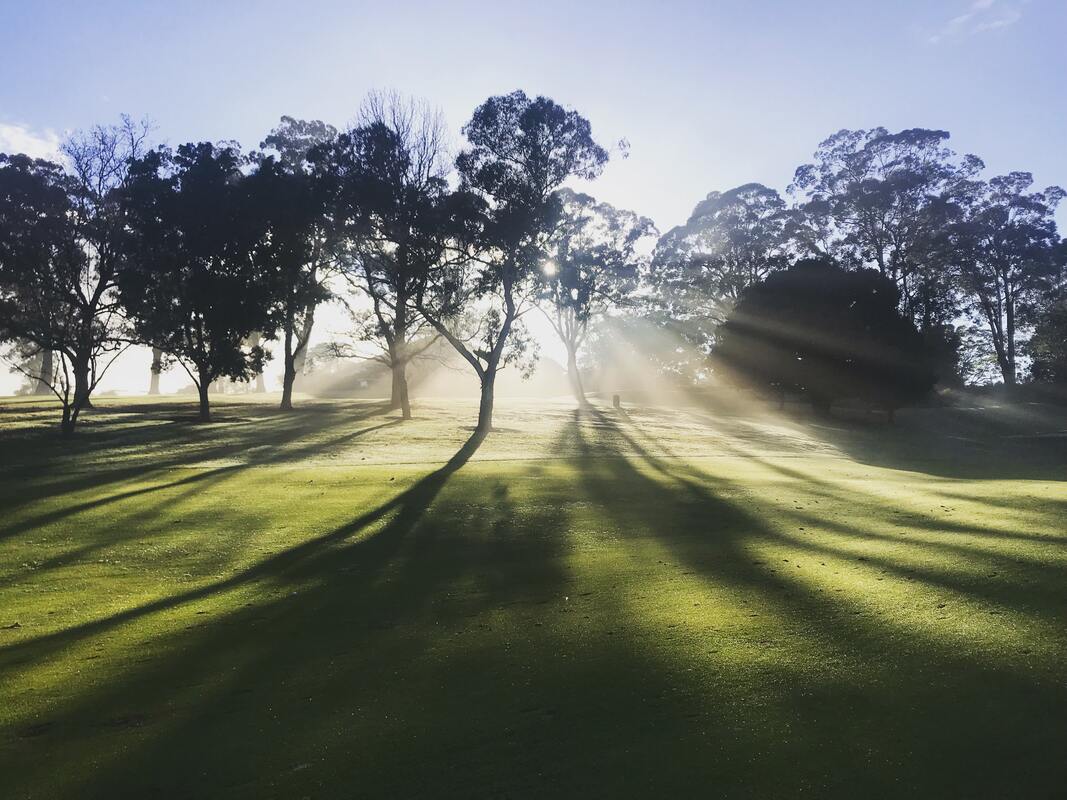 Pentecost Avenue, Pymble, NSW by Mandy Henry on Unsplash Pentecost Avenue, Pymble, NSW by Mandy Henry on Unsplash This question shows my age, but do some of us remember when the Holy Spirit was typically known as ‘the Holy Ghost’? How words change. For ‘Holy Ghost’ used to be very traditional. ‘Ghost’ indeed derives from the Old English word gast. It means ‘soul’ or ‘spirit’, and is the equivalent of the Latin word spiritus. Similar words are found in other Germanic influenced languages, such as geest in Dutch and geist in German (from which we also have the influential compound word Zeitgeist’, meaning spirit of the time, or generation). Today however, most people would relate the word ‘ghost’ to something that goes bump in the night, or something very insubstantial. So, in recent decades, Christians have made a shift from ‘Holy Ghost’ to ‘Holy Spirit’. In doing so, we have rediscovered much of what ‘Holy Ghost’ used to represent in centuries past, and have also encountered that mystery afresh. Yet do ghostly perspectives of the Holy Spirit still limit our own lives and understandings, and certainly many aspects of wider Christian Faith?...  photo: Rachel Cook on Unsplash photo: Rachel Cook on Unsplash Do you identify with the conversion of Saul, later re-named Paul, which we hear read today? It does not fit us all. Yet it is certainly a striking story, which has powerfully influenced some, especially evangelical, Christian traditions. Indeed, it has sometimes become a classic model for becoming a Christian. It speaks, for example, of a remarkable repentance – or turning around, which is really what repentance means. It speaks of whole-hearted, whole-self transformation of life in Christ; and, above all, it speaks of the transforming power of God’s love and grace. All of this, we may say, are indeed important aspects of Christian Faith, and, as such, the story challenges us, like Saul/Paul, to consider the direction in which we are traveling and what is drawing us and companioning us on the way. All of these things also go to the heart of the sacrament of baptism which we were planning to share this morning. Unfortunately this has had to be postponed due to the baptismal candidate having contracted COVID-19. Nonetheless, it is still worth us reflecting today on the sacraments of baptism and of communion, which we do share together this morning. For, like Saul’s conversion, what do we make of them? How does God’s grace work through them, and in particular moments of our lives?…  photo: Mohamed Nohassi on Unsplash photo: Mohamed Nohassi on Unsplash How do we want our stories to end? Whether it is our own story, or that of our community, our nation, our world, much is up to us. Now, we may not have much room for manoeuvre. All kinds of forces help shape our lives, internal and unconscious, as well as external and recognised. Yet we still have power to shape our stories, even if only by our attitudes, and by how we receive and respond to what happens to us. This truth is at the very heart of the Gospel and the power of love, forgiveness, and justice seeking. For, however you view the Resurrection stories, a common feature is their open, unfinished nature. The tomb is not sealed. The body is not there or is transformed. The end is a new beginning. So how do we want the story to continue?... 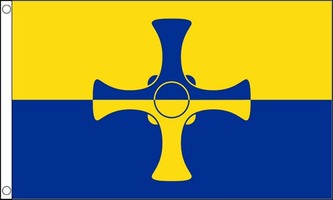 Today, where I was born, it is Wor Cuddy’s Day – that is to say, Our Cuthbert’s Day, the day of the greatest of the so-called ‘northern saints’, Cuthbert of Lindisfarne. Now Cuthbert lived back in the 7th century of the Christian era, but his influence lives on strongly, especially among the people of the north east of England. For, historically, Cuthbert is the official ‘Protector of the North’, not least of County Durham, in which I was born. So today, the 20th March, has become County Durham Day and the county flag flies high, with the distinctive cross of St Cuthbert emblazoned on the colours of blue and gold (see the front of the liturgy sheet). More significantly for all of us however, there are aspects of Cuthbert’s life which are still life-giving. Not least, this is in terms of a spirituality which seeks to learn from the more than human environment, of God speaking to us intimately through the land and seas - and through the birds, animals and other creatures with which we share them. For, as we hear Jesus’ parable of the fig tree today, and reflect on our Lenten themes, we are encouraged to recognise the great breach between humanity and God’s wider Creation. With Cuthbert, we are called to return our hearts to the heartbeat of Creation and to live more kindly in rhythm with it… 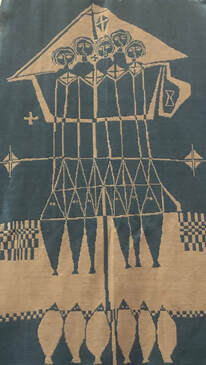 I thought today we might play with the ideas of hooks and fishing; of hooking and being hooked; of catching alive and who is to be caught. Our beautiful weaving here in church today (see image left) and photographed on the front of this week’s worship booklet reminds us that fish and fishing are woven into the story of Jesus from the beginning. Indeed, it is believed some early Christians made eucharist with bread and fish rather than bread and wine – probably not a great choice in the Australian sun and I hate to think what the COVID regulations would make of that idea! But there is no getting away from the fact that some of the first disciples of Jesus made a living from fishing.  ‘The Body doesn’t lie’, they say. Well, certainly it can powerfully reveal and prompt us to the truth. Years ago, for example, I remember a yoga teacher asking me to curl up into the foetal position and give myself a hug, expressing my love for myself. But I simply couldn’t manage it. I took up position, but my arms just wouldn’t do it. Even when I actively exercised my mind to give myself the appearance of a hug, my body would not obey. For you cannot simply command love. It has to be received, acknowledged, and embodied. Or, to put it another way, love has to be breathed in and breathed out. All of this takes us to the heart of Jesus’ teaching about the commandments (in Mark 12.28-34), and to the core of the Biblical tradition… 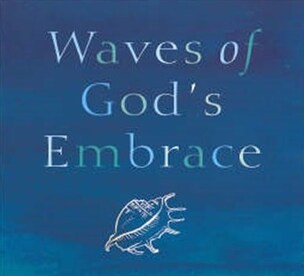 One of the most memorable voices of my English schooldays was that of the great cricket commentator John Arlott. He reported on many things, and was also a poet, wine-connoisseur, hymn-writer, part time politician, anti-apartheid spokesperson and renowned host of dinner parties. His distinctive radio tones and brilliant turns of phrase illuminated English summers and some other special occasions, notably the great Centenary Test Match in Melbourne in 1977. Thousands of miles away I remember being curled up through the night listening under the covers to John’s words. His descriptions were typically unforgettable: such as that of the scene of Dennis Lillee’s destruction of the English first innings, where, he said, even the ‘seagulls were standing in line like vultures’, and also Derek Randall’s heroic second innings fightback – an innings as inimitable as John’s own expressions. Gordon Greenidge, the great West Indian batsman, even named him ‘the Shakespeare of commentators.’ Above all, however, I will always cherish John Arlott’s vigorous standing up for our common humanity, not least over apartheid. He had learned to move on from his English colonial upbringing from Indian cricketers, not least the wonderful Vijay Merchant. Famously then, he was involved at the forefront of cricket’s anti-apartheid struggles. Indeed, as early as 1948, visiting South Africa, he refused to fill in the section marked ‘race’ on the departure form, except to put the word ‘human’. ‘What do you mean?’, said an angry immigration officer aggressively. ‘I am a member of the human race’ came back the reply. Eventually he was just told to ‘get out’. How I wonder would John Arlott fare today with resurgent racism, nationalism, and the exclusivism of so many immigration policies? What price human unity today? What, in this Week of Prayer for Christian Unity, does faith have to contribute?... 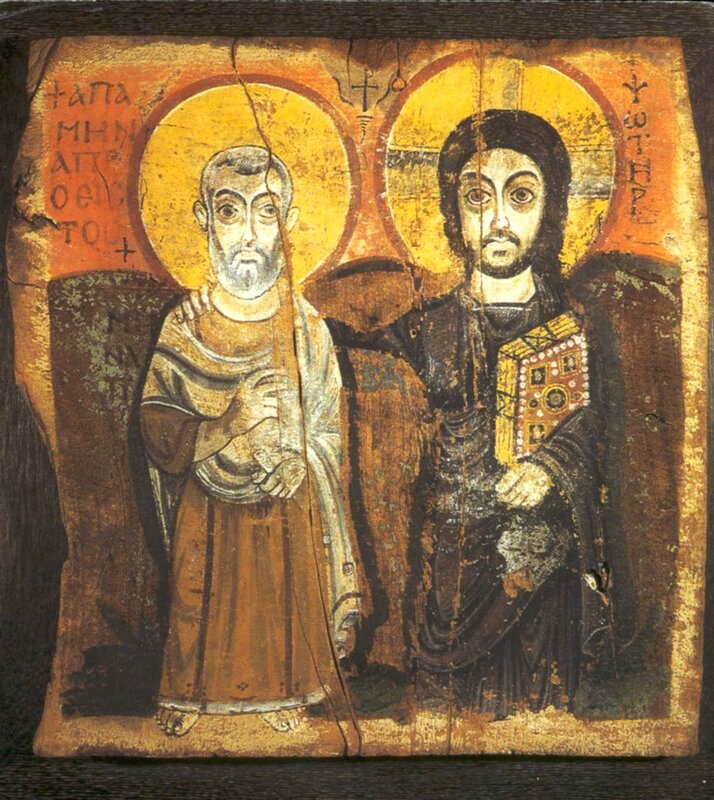 icon of friendship, ancient Coptic - Jesus and Abba Menas icon of friendship, ancient Coptic - Jesus and Abba Menas What is your ‘good news’? One of the theological college principals I used to work with would occasionally ask this of students. If you had to put the good news of your Christian faith in a short phrase, he would say, what would it be? Now he was certainly not trying to dumb down faith, under the pressures of modern media attention spans and ‘church growth’ gurus. That, to be honest, would hardly have worked! Our theological college was, after all, the child of two theological traditions - one of them radically incarnationalist and the other powerfully modernist – both of which had rattled the cages of conservative and complacent faith in the past. No, he was certainly not attempting to avoid deep and complex questions and intelligent reflection. He was just trying to encourage us to affirm what we could affirm and to be able to share that clearly with others. For, let’s be honest, much theology and Christian communication can be pretty difficult to grasp, can’t it? Nor is it just ‘traditional’ faith communication. Sometimes, to be quite frank, so-called ‘liberal’ or ‘progressive’ theology is also not very clear about ‘good news’. It can tell us a great deal about questions and debates, and help us move on from much that is death-dealing. Yet it can sometimes be less helpful in affirming what, in Jesus and Christian Faith, is truly life-giving. So, what is our ‘good news’ today?... 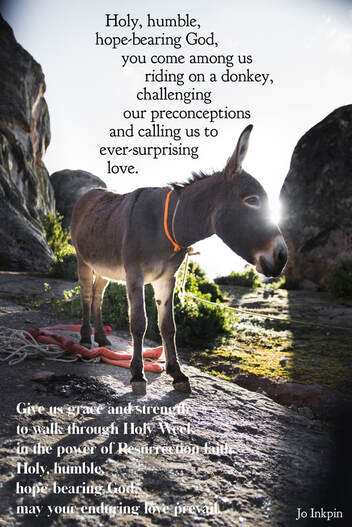 prayer by Jo Inkpin; Unsplash photo prayer by Jo Inkpin; Unsplash photo ‘Is your Church involved in a rally or political or symbolic action every week?’ One of my daughters asked me this, shortly after our Earthweb-led involvement in the recent ‘Sound the Alarm’ Green Faith events, followed shortly by the presence of some of us on the March4Justice and planning for today’s Palm Sunday Refugee rally. I had to be honest: ‘well’, I said, ‘pretty much every week we, or some of us at least, are involved in something.’ And why wouldn’t we be? Today’s Gospel reading after all (Mark 11.1-10) is a reminder of what I would call the ‘prophetic performance art’ which reappears again and again in the Biblical stories. The so-called ‘entry into Jerusalem’ by Jesus is but one example of this - admittedly particularly significant. For it does not stand alone, nor was it originally intended to be simply repeated or venerated. Rather, in embodying Jesus’ own call to transformation, it seeks to inspire us to our own prophetic performance art. In this we are not exactly social influencers like today’s social media stars, but we are like divine influencers in reshaping our world. All of which can sound, or become, quite pretentious. So maybe a better, arguably more biblical, way of putting it is that we are called to become the wonky donkey… |
Authors
sermons and reflections from Penny Jones & Josephine Inkpin, a same gender married Anglican clergy couple serving with the Uniting Church in Sydney Archives
June 2024
Categories
All
|
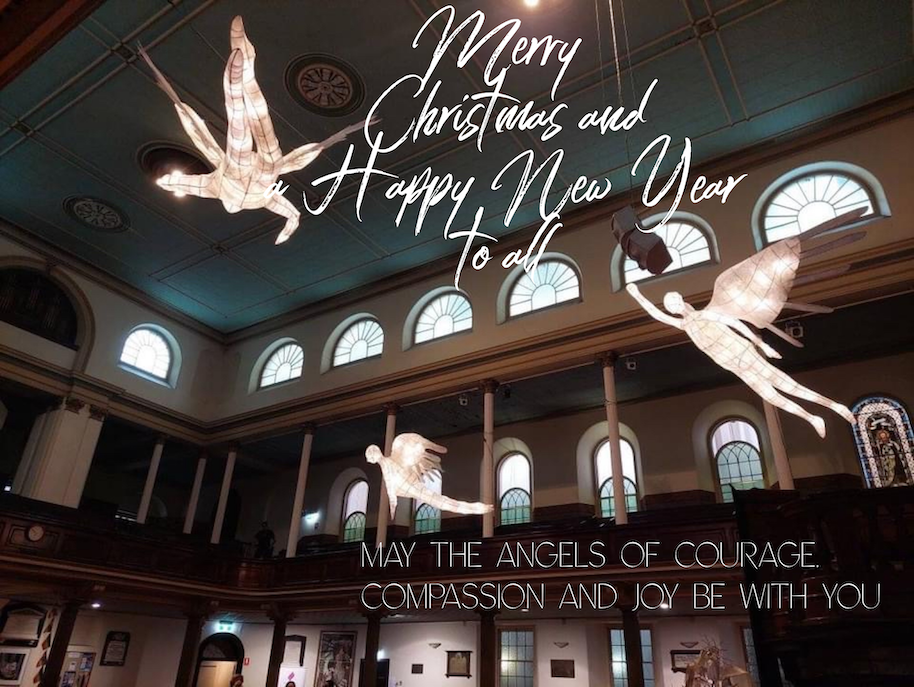
 RSS Feed
RSS Feed